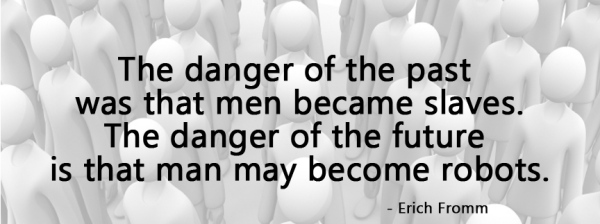We HAD been warned about coming digital stupidity
Another of those obvious things that are never repeated too much.

P. Burns just reminded the world that Bonhoeffer’s “Theory of Stupidity Explains The World Perfectly”. Here, I would like to highlight one specific contributor to that theory.
Dietrich Bonhoeffer, a German theologian, famously wrote that “Stupidity is a more dangerous enemy of the good than evil”. Said Bonhoeffer (emphasis mine):
“Against stupidity we have no defense. Neither protests nor force can touch it. Reasoning is of no use. Facts that contradict personal prejudices can simply be disbelieved-indeed, the fool can counter by criticizing them, and if they are undeniable, they can just be pushed aside as trivial exceptions. So the fool, as distinct from the scoundrel, is completely self-satisfied. In fact, they can easily become dangerous, as it does not take much to make them aggressive.”
“In conversation with [someone stupid], one virtually feels that one is dealing not at all with a person, but with slogans, catchwords and the like that have taken possession of him. He is under a spell, blinded, misused, and abused in his very being. Having thus become a mindless tool, the stupid person will also be capable of any evil and at the same time incapable of seeing that it is evil.”
Burns summarizes the latter paragraph by writing that stupid people “function on the level of slogans, catchwords, and low-level rallying cries."
Bonhoeffer also pointed out that stupidity was not an individual as a matter of crowds. Stupidity is a group phenomenon. Humans are social animals, and is this very sociability that is at the base of stupidity: “stupidity is perhaps less a psychological than a sociological problem”.
Stupidity, in noisy times

Bonhoeffer conclusions should be paired with those of Erich Fromm, a psychologist who argued that, whenever there is too much chaos and noise,
“The result of this kind of influence is twofold: one is a skepticism and cynicism towards everything which is said or printed, while the other is a childish belief in anything that a person is told with authority. This combination of cynicism and naïveté is very typical of the modern individual. Its essential result is to discourage him from doing his own thinking and deciding.”
“The sick individual finds himself at home with all other similarly sick individuals. The whole culture is geared to this kind of pathology. The result is that the average individual does not experience the separateness and isolation the fully schizophrenic person feels. He feels at ease among those who suffer from the same deformation; in fact, it is the fully sane person who feels isolated in the insane society.”
Bohnoeffer and Fromm were from THIS century
Bonhoeffer wrote about stupidity during World War II, that is well before the advent of anything digital. Fromm died in 1980, when computers were still used almost exclusively by professionals, and even then mostly online. Yet, what they wrote 80 and 50 years ago is what happens today online.
Read those quotes again: fake news, conspirationism, eco chambers, alternative facts, filter bubbles, hate speech, politics by tweets and memes… almost everything that’s bad online today was already all there, except by name. It’s like Bohnoeffer and Fromm were contemporary social media researchers, describing the result of their observations in 2022.
The best booster of stupidity, and those who did not study it
As written above, I wrote this post to highlight one specific contributor of what Bonhoeffer and Fromm described. Here it is.
If stupidity, cynicism and naïveté are a natural consequence of exposing crowds of humans to certain stimuli…
how hard it would have been, for Zuckerberg, Dorsey & C, to know from day one that services like theirs, that by design encourage 24/7 self-segregation in cult-like groups, and chaotic interaction by means of “slogans, catchwords and the like”, would have had certain effects?
If Bonhoeffer and Fromm could describe so precisely how social media would surely boost stupidity, skepticism and so on… without ever seeing an actual computer or the Web, how come Zuckerberg, Dorsey etc.. could not?
An obvious, if uncomplete answer is easy to see: I’m pretty sure those guys only studied coding, not psychology and certainly not theology. They only studied how code, not human beings really work. But you can’t develop technology that makes the world a better place, if technology is all you ever learn. THIS is “another of those things that are never repeated too much”.
Who writes this, why, and how to help
I am Marco Fioretti, tech writer and aspiring polymath doing human-digital research and popularization.
I do it because YOUR civil rights and the quality of YOUR life depend every year more on how software is used AROUND you.
To this end, I have already shared more than a million words on this blog, without any paywall or user tracking, and am sharing the next million through a newsletter, also without any paywall.
The more direct support I get, the more I can continue to inform for free parents, teachers, decision makers, and everybody else who should know more stuff like this. You can support me with paid subscriptions to my newsletter, donations via PayPal (mfioretti@nexaima.net) or LiberaPay, or in any of the other ways listed here.THANKS for your support!